Trump administration says it’s legal to discriminate against transgender workers
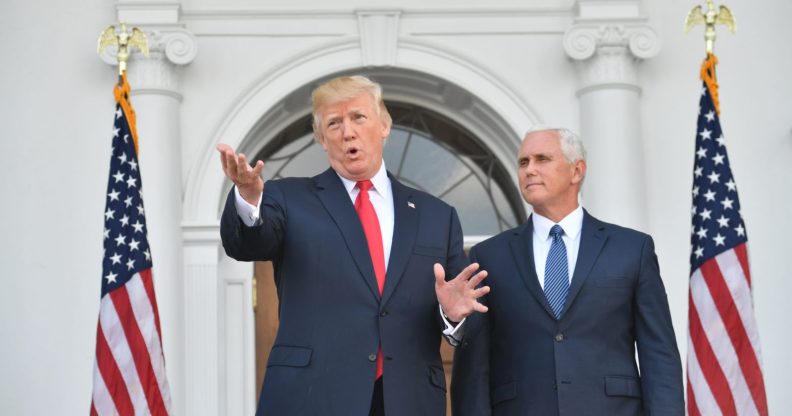
(Getty)
The Trump administration is continuing its attack on civil rights laws by rolling back a policy protecting transgender employees from discrimination.
The move, from Trump’s Attorney General Jeff Sessions, is just the latest in a string of attacks on trans equality in the past few months
As well as banning transgender people from serving in the military, Trump officials have stripped civil rights protections for transgender children.
Sessions has gone one step further today, in also rolling back discrimination protections for transgender people in employment.
The dispute revolves around Title VII of the 1964 Civil Rights Act, which specifically outlaws discrimination in employment based on sex.
Under the Obama administration, this was interpreted as protecting people who are transgender, as being trans is a sex-based characteristic.
But according to Buzzfeed, a government memo to US attorneys has revoked this guidance.
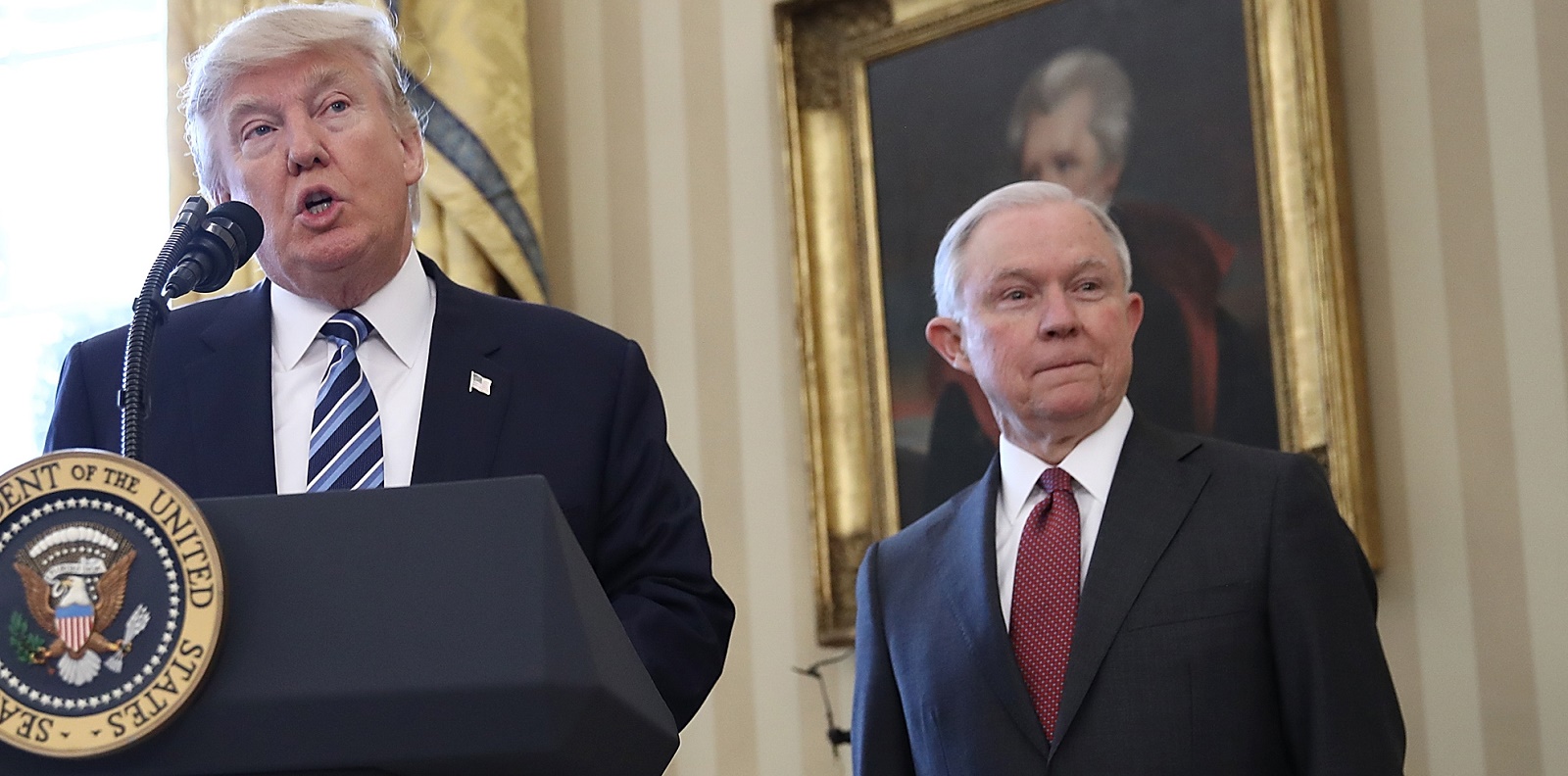
Jeff Sessions and Donald Trump
Sessions wrote: “Title VII’s prohibition on sex discrimination encompasses discrimination between men and women but does not encompass discrimination based on gender identity per se, including transgender status”.
It is just the latest attack on the Civil Rights Act from the Trump administration, which has also sought to reduce its protections for gay workers through the courts.
As Republicans in Congress have long blocked efforts to pass a specific LGBT anti-discrimination measure, there is no explicit federal protection for LGBT people facing discrimination at work beyond Title VII.
DNC spokesperson Joel Kasnetz told PinkNews: “This week, Jeff Sessions escalated the Trump administration’s war on LGBTQ people
“By reinterpreting our employment laws to try to stop protecting transgender people from discrimination, Donald Trump, Mike Pence, and Jeff Sessions have revealed their real goal – turn the clock back to a time when life was even more difficult for LGBTQ people, transgender individuals in particular.
“Fortunately, the courts have rebuked this bigotry and made clear that LGBTQ Americans have the right to be free from discrimination in the workplace.
“It’s time for Congress to do the same, because Attorney General Sessions can’t be trusted to protect us or our civil rights.
“Democrats support the right of LGBTQ people to live and work without fear and demand Sessions stop using the Department of Justice to further this administration’s divisive agenda.”
Sarah Kate Ellis, President and CEO of GLAAD, said: “This outright attack on transgender Americans has proven, once again, that Attorney General Jeff Sessions is working according to his own ideology and not actual justice.
“Sessions joins President Trump and an administration who are stopping at nothing to strengthen institutional discrimination and walk back the hard-fought progress made by the LGBTQ community.”
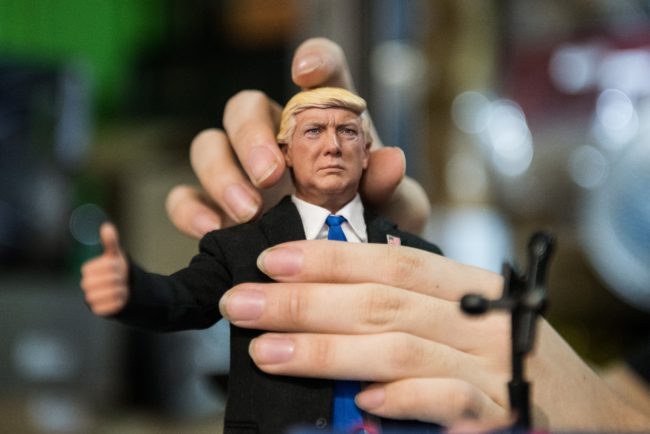
Puppet leader Donald Trump (Photo by ANTHONY WALLACE/AFP/Getty Images)The DOJ last week made an uninvited intervention in a workplace discrimination case, with officials this week appearing before the U.S. Court of Appeals for the 2nd Circuit.
The Manhattan court is currently hearing the case of Donald Zarda, a former skydiving instructor who alleges that his old company, Altitude Express Inc, fired him because of his sexuality.
But in its surprise intervention, federal government officials sided with the employer – arguing that it is entirely legal to discriminate against gay employees on a federal level.
Deputy Assistant Attorney General Hashim M. Mooppan appeared before the court this week to argue against gay rights protections.
Mooppan insisted: “Employers under Title VII are permitted to consider employees’ out-of-work sexual conduct.
“There is a commonsense, intuitive difference between sex and sexual orientation.”
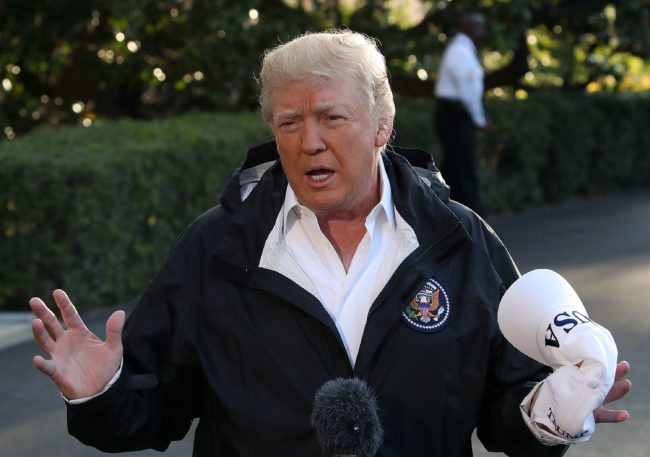
(Photo by Mark Wilson/Getty Images)
The DOJ had insisted: “Discrimination based on sexual orientation does not fall within Title VII’s prohibition on sex discrimination because it does not involve “disparate treatment of men and women”.
“Rather than causing similarly situated ‘members of one sex [to be] exposed to disadvantageous terms or conditions of employment to which members of the other sex are not exposed’, differential treatment of gay and straight employees for men and women alike.”
The DOJ also argued somewhat circularly that it was clear that existing civil rights law doesn’t protect gay people, because Congress remains opposed to “proposed legislation that would prohibit discrimination in employment based on sexual orientation”.
It said: “When adopting Title VII’s ban on sex discrimination in 1964, and especially when amending it in 1991, Congress was well aware of the distinct practice of sexual orientation discrimination and chose not to ban it also.”
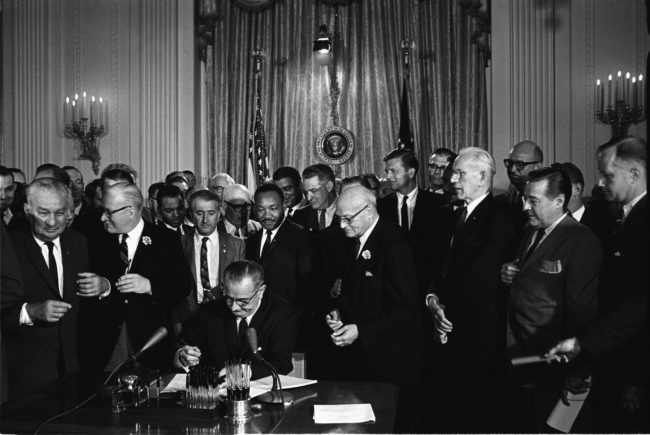
The signing of the Civil Rights Act
Sarah Warbelow, Human Rights Campaign Legal Director, told PinkNews in a statement: “Attacks against the LGBTQ community at all levels of government continue to pour in from the Trump-Pence Administration.
“In one fell swoop, Trump’s DOJ has provided a roadmap for dismantling years of federal protections and declared that lesbian, gay, and bisexual people may no longer be protected by landmark civil rights laws such as the Fair Housing Act, Title IX, or Title VII.
“For over a decade, courts have determined that discrimination on the basis of LGBTQ status is unlawful discrimination under federal law.
“The [DOJ’s actions are] a shameful retrenchment of an outmoded interpretation that forfeits faithful interpretation of current law to achieve a politically-driven and legally specious result.”
Elsewhere today, the Trump administration defended its transgender military ban in court.
It filed a 44-page brief calling for the court to dismiss a request for an immediate injunction against the ban.
Incredibly, the document cites court rulings in favour of Don’t Ask Don’t Tell – which banned gay people from the military – as precedent for banning trans people.
Implemented in the 1990s, Don’t Ask Don’t Tell survived a number of court challenges before it was repealed by lawmakers under President Obama.

(Photo by Spencer Platt/Getty Images)
The brief cites it as case law, insisting: “Courts have upheld exclusionary policies in the military while at the same time invalidating similar policies in the civilian sphere.
“Of course, there are limits: no amount of deference could save the military’s decision to exclude a race or religion from being considered under the strict scrutiny standard.
“But outside those extreme examples, the military’s policies are entitled to a ‘healthy deference’ their civilian counterparts do not enjoy.”

